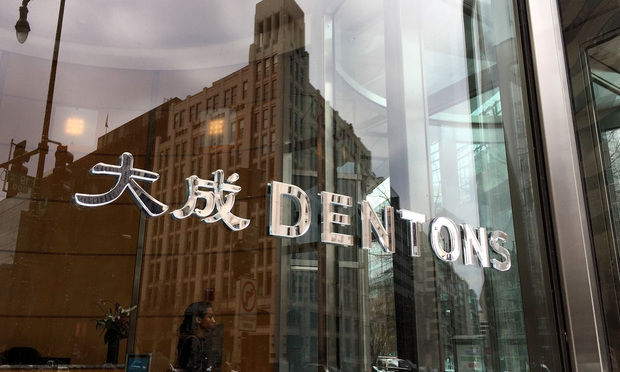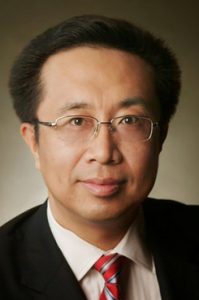Five Years After the Dentons-Dacheng Merger, Is Integration Imminent?
In an exclusive interview with Law.com International, Dentons' global chairman Joe Andrew, global CEO Elliott Portnoy, and China managing partner Peng Xuefeng discuss the status of the combination five years out.
February 03, 2020 at 03:00 AM
11 minute read
 Photo: Diego M. Radzinschi/ALM
Photo: Diego M. Radzinschi/ALM
Nearly five years have passed since Dentons and the Chinese firm Dacheng Law Offices announced they planned to merge — a move that would pave the way for Dentons to spread its brand across the globe and result in the world's largest law firm.
But in the past five years, the integration of the two firms in China has been challenging, if not daunting. This was not unexpected: After the combination of Dentons and Dacheng went live in late 2015, the two firms agreed to a three-year transition period to work on integrating Dacheng's then-43 mainland China offices with the rest of the firm's offices, which at the time were mostly in the West and operated on different rate and compensation systems.
The obstacles to integration were not due solely to differences between Dacheng's mainland China offices and Dentons' offices, however. They also arose because of differences within Dacheng. For example, the majority of legacy Dacheng's offices were not in international business centers such as Beijing, Shanghai or Guangzhou; they handled mostly domestic matters and barely had any cross-border interactions.
Three years, as it turned out, was not enough to integrate the two distinct firms. In 2018, at the conclusion of the transition period, both the China side and the rest of the firm agreed to an additional five-year, second phase transition period. The additional five years is referred to in China as the "five-year plan" — a term that echoes the Chinese government's Five Year Plans, which describe the country's planned social and economic initiatives.
Dentons refers to the new plan simply as "Phase 2."
In an interview with Law.com International, Dentons' global chairman Joe Andrew, global CEO Elliott Portnoy, and China managing partner Peng Xuefeng, discussed the status of the combination five years out. The goal for the second phase, according to Andrew, is that by 2023 all offices in China will be delivering the firm's best practices and will be fully integrated into the global law firm — even those located in remote regions, where lawyers may have less experience operating in a fashion consistent with a global law firm.
But that will not be easy. Peng Xuefeng, who in addition to being Dentons' China managing partner was founder of legacy Dacheng, said the first phase of integration following the merger focused on integrating the firm's management and practices. Under the five-year plan or phase 2, the firm will continue to work on resource sharing and office management automation, but the focus will be on cultural integration, he said.
China challenges
 Elliott Portnoy
Elliott PortnoyDentons now has 45 mainland China offices — up from the 43 it had at the time of the merger. The China offices now cover all provincial capitals and major commercial centers of the country, but there is still a huge imbalance among offices—a natural result of the country's economic disparity and the even greater gap between major legal markets and the rest of the country. The firm's headquarters in Beijing and offices in Shanghai, Shenzhen, and Guangzhou, and other affluent coastal regions are bigger in size and make more of a financial contribution to the overall revenue.
In well-developed areas, the offices have a high level of management efficiency, better internal management, human resources, and business processing, Peng said. But offices in the western and inland parts of the country don't have the same level of support. "We are trying to narrow that gap," he said. "This is something we are working on."
This could be crucial, as ultimately, discrepancies among a firm's offices create challenges to the client experience, said Tony Williams, a principal at London-based Jomati Consultants. Clients don't really care whether firms are integrated in management and financial terms, he said. What really matters to them is service.
"When looking at locations, the key issue is the quality and consistency of the service provided," he explained. "This is fundamentally what a law firm's brand is."
"If I buy a Mars [chocolate] bar anywhere in the world, I know exactly what it will taste like and whether or not I will like it," he continued. "But if a Mars bar tasted very different in every country in which I bought it, I might be more reluctant to buy it in the future except from a country where I had tried it and liked it!"
Portnoy insists that the remaining hurdles in China can be overcome and says the need for a five-year extension was not a setback.
"This was entirely planned and expected," he said. "The pace of implementation in that period of transition and the harmonization and best practice adoption is moving very well and very effectively across the China region."
"It's just math"
To be sure, combining the two firms was a formidable undertaking from the outset. Dentons had 2,368 lawyers and had roots in the United States, the United Kingdom, Canada and France at the time of the combination. Dacheng at the time was the largest law firm by head count not only in China, but in the wider Asia-Pacific region.
The combination gave Dentons an instant bump of more than 4,000 lawyers and it became the first-ever global firm with a major U.S. presence to combine with a large Chinese firm. Five years later, Portnoy still takes enormous pride in the fact that Dentons continues to be the only global law firm that has accomplished this feat.
 Joe Andrew
Joe Andrew"Our growth rate is unique in the history of the legal profession," Andrew said. "Lawyers, no matter where they are, always believe if you can bring together two very big institutions in the East and the West, that you can bring people together anywhere.
Dentons, which is structured as a Swiss verein, operates out of more than 182 locations in about 74 countries. Despite the culturally and regionally disparate offices, Portnoy and Andrew insist that Dentons is an integrated law firm globally. And neither of them is deterred by the hurdles in China.
In fact, the China model is now being extended to other markets. In October, the firm combined with two more law firms in the U.S. and vowed to become the first "national" law firm in the U.S.
"It's important to see our efforts as not just to have more than 40 offices in China, but to have more than 30 offices across the U.S., to be the first truly national firm throughout the U.K., and to be the firm to have the widest and broadest spread throughout all Europe," Andrew said.
And positive client feedback is what's giving Dentons' leaders validation for their model. In China, for example, one of the firm's biggest achievements during the first transition period was the improvement that its lawyers have received on directory rankings and other forms of third-party recognition. The number of Dentons' China lawyers who were ranked on Chambers, for example, went from 18 in 2015 to 70 in 2019.
 Peng Xuefeng
Peng XuefengPeng said combining with a global firm has given lawyers in China more training, has helped them improve client service quality and has made them more confident in taking part in third-party ratings. Andrew noted that the Chinese lawyers' improved performance in rankings is also due to the benefits they get from the firm's massive scale.
"It's just math. We simply have more talent that we can apply to the individual matters clients bring to us," he said. "Clients say better things about us because [they are] happier with the work as we are applying more expertise."
In May 2019, Dentons reached a global head count of 10,000 lawyers. The firm has made more combinations since.
"We never met a client that wants 10,000 lawyers, they just need one," said Andrew. "But we are simply mathematically more likely to find the exact right team to put together with the right experience, the right background, and [have] done that kind of deal before or solve that kind of dispute before.
"We are choosing among more than 10,000, as opposed to 1,000 or 100," he said.
Jomati's Williams doesn't believe success is in the math. "The question is not so much the overall size of the firm but the depth and breadth and credibility of the specialists that they have," he said.
A relatively small firm of 100 lawyers that focuses on a few areas of work could well include a number of the most highly rated practitioners in the relevant areas, Williams said. "To some extent, the size may give you a greater bench strength, but only if that bench strength is of the appropriate quality. Most of the largest 100 law firms in the world have sufficient depth and breadth to service their client's needs," he added.
More combinations coming
But Dentons is not done combining with firms across the globe. "We believe the combination in China is reflective of what makes us so different," said Portnoy, adding that since the combination with Dacheng, the firm has seen a 218% increase in referrals from China to other Dentons locations, and an 871% increase in referrals to China from other regions of Dentons.
"We are designed to be different, providing scale and reach that none of our competitors can match," said Portnoy.
Andrew is convinced that the model of going local and scaling up is the future of the legal profession. "Not only [do we have] 40 offices in China, but we are on our way to having 40 offices in Africa. [We] will be the first truly pan-African firm, and the first truly pan-Latin American firm."
Andrew noted that Dentons may have been the first, but it's not going to be the only firm to venture out. In China, more firms are bulking up with aggressive expansions. Yingke Law Firm, with 7,572 lawyers, now has the most lawyers of any firm in the Asia Pacific. The success of Yingke and Dentons has encouraged more to follow. Beijing-based Jingsh Law Firm has amassed more than 3,500 lawyers in 41 offices, the vast majority of which were opened after 2016; the little-known firm is also harboring an ambitious global plan and is launching a New York office in February.
While Dentons has slowed its expansion pace in China in the past few years as the firm turned its attention to integration, it has not quite stopped. In 2018, the firm launched in Lanzhou, provincial capital of the northwestern province of Gansu. And Peng said Dentons is in the process of launching in Sanya, where the government has announced favorable policies to attract businesses.
Peng, who started Dacheng with less than 10 people in 1992, isn't worried about competition.
"We need to develop the legal profession in China. The market in China needs 10 to 20 more Dentons," he said. "If you are strong, you are not afraid of competition. It will only make you stronger."
READ MORE:
Dentons Chases Big Four's Footprint With New US Strategy
Dentons' Latest Merger Feat: Five Firms in One Day in 'Pan-African' Bonanza
This content has been archived. It is available through our partners, LexisNexis® and Bloomberg Law.
To view this content, please continue to their sites.
Not a Lexis Subscriber?
Subscribe Now
Not a Bloomberg Law Subscriber?
Subscribe Now
NOT FOR REPRINT
© 2025 ALM Global, LLC, All Rights Reserved. Request academic re-use from www.copyright.com. All other uses, submit a request to [email protected]. For more information visit Asset & Logo Licensing.
You Might Like
View All
KPMG's Bid To Practice Law in US On Hold As Arizona Court Exercises Caution

Combative Arguments at EU's Highest Court Over Google's €4.13B Antitrust Fine Emphasize High Stakes and Invoke Trump
4 minute read
Law Firms 'Struggling' With Partner Pay Segmentation, as Top Rainmakers Bring In More Revenue
5 minute readTrending Stories
- 1Troutman Pepper, Claiming Ex-Associate's Firing Was Performance Related, Seeks Summary Judgment in Discrimination Suit
- 2Law Firm Fails to Get Punitive Damages From Ex-Client
- 3Over 700 Residents Near 2023 Derailment Sue Norfolk for More Damages
- 4Decision of the Day: Judge Sanctions Attorney for 'Frivolously' Claiming All Nine Personal Injury Categories in Motor Vehicle Case
- 5Second Judge Blocks Trump Federal Funding Freeze
Who Got The Work
J. Brugh Lower of Gibbons has entered an appearance for industrial equipment supplier Devco Corporation in a pending trademark infringement lawsuit. The suit, accusing the defendant of selling knock-off Graco products, was filed Dec. 18 in New Jersey District Court by Rivkin Radler on behalf of Graco Inc. and Graco Minnesota. The case, assigned to U.S. District Judge Zahid N. Quraishi, is 3:24-cv-11294, Graco Inc. et al v. Devco Corporation.
Who Got The Work
Rebecca Maller-Stein and Kent A. Yalowitz of Arnold & Porter Kaye Scholer have entered their appearances for Hanaco Venture Capital and its executives, Lior Prosor and David Frankel, in a pending securities lawsuit. The action, filed on Dec. 24 in New York Southern District Court by Zell, Aron & Co. on behalf of Goldeneye Advisors, accuses the defendants of negligently and fraudulently managing the plaintiff's $1 million investment. The case, assigned to U.S. District Judge Vernon S. Broderick, is 1:24-cv-09918, Goldeneye Advisors, LLC v. Hanaco Venture Capital, Ltd. et al.
Who Got The Work
Attorneys from A&O Shearman has stepped in as defense counsel for Toronto-Dominion Bank and other defendants in a pending securities class action. The suit, filed Dec. 11 in New York Southern District Court by Bleichmar Fonti & Auld, accuses the defendants of concealing the bank's 'pervasive' deficiencies in regards to its compliance with the Bank Secrecy Act and the quality of its anti-money laundering controls. The case, assigned to U.S. District Judge Arun Subramanian, is 1:24-cv-09445, Gonzalez v. The Toronto-Dominion Bank et al.
Who Got The Work
Crown Castle International, a Pennsylvania company providing shared communications infrastructure, has turned to Luke D. Wolf of Gordon Rees Scully Mansukhani to fend off a pending breach-of-contract lawsuit. The court action, filed Nov. 25 in Michigan Eastern District Court by Hooper Hathaway PC on behalf of The Town Residences LLC, accuses Crown Castle of failing to transfer approximately $30,000 in utility payments from T-Mobile in breach of a roof-top lease and assignment agreement. The case, assigned to U.S. District Judge Susan K. Declercq, is 2:24-cv-13131, The Town Residences LLC v. T-Mobile US, Inc. et al.
Who Got The Work
Wilfred P. Coronato and Daniel M. Schwartz of McCarter & English have stepped in as defense counsel to Electrolux Home Products Inc. in a pending product liability lawsuit. The court action, filed Nov. 26 in New York Eastern District Court by Poulos Lopiccolo PC and Nagel Rice LLP on behalf of David Stern, alleges that the defendant's refrigerators’ drawers and shelving repeatedly break and fall apart within months after purchase. The case, assigned to U.S. District Judge Joan M. Azrack, is 2:24-cv-08204, Stern v. Electrolux Home Products, Inc.
Featured Firms
Law Offices of Gary Martin Hays & Associates, P.C.
(470) 294-1674
Law Offices of Mark E. Salomone
(857) 444-6468
Smith & Hassler
(713) 739-1250









